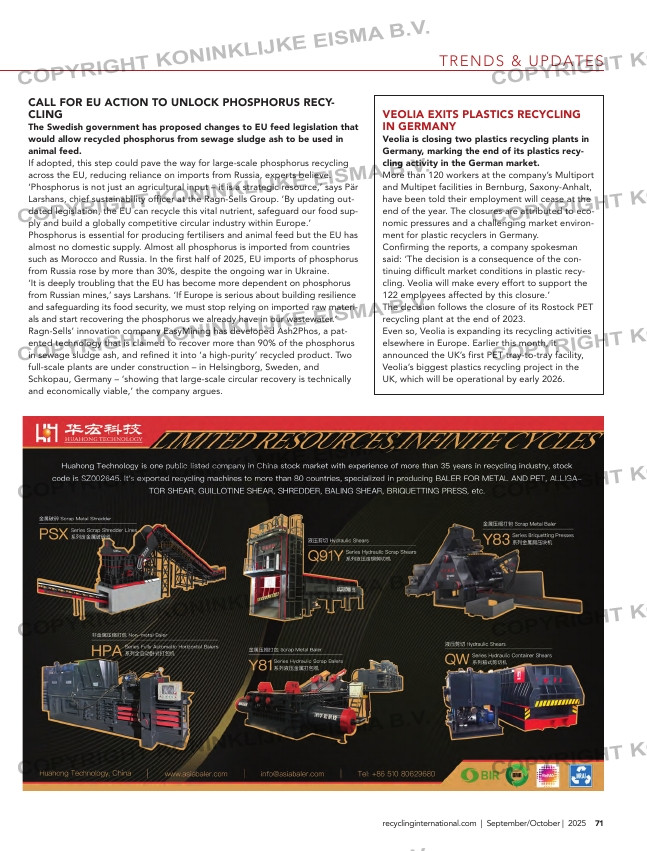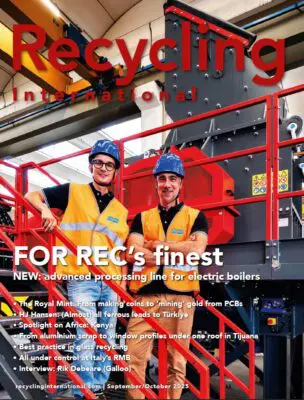Page 79 from: Recycling International September/October 2025

TRENDS & UPDATES
71recyclinginternational.com | September/October | 2025
UK KICKS OFF PACKAGING EPR SCHEME
The UK Government has formally launched an extended producer
responsibility (EPR) scheme for packaging with a £1.1 billion (EUR 1.27
billion) fund to boost collection and sorting infrastructure.
The EPR scheme works by charging fees to businesses that use packaging
to meet the costs of collecting and recycling it. The costs will be higher for
hard-to-recycle materials and less where packaging can be reused or
refilled.
As a result, it is expected businesses will reduce the amount of packaging
they use, shift to more recyclable materials and design new products that
can be recycled and reused more easily, while stopping waste from going
to landfill or incinerators.
Politicians expect the investment, part of a ‘Plan for Change’ policy, to
unlock regional growth, create new green jobs across the country and
boost household recycling rates which have flat-lined for years.
The money could be spent on offering local residents more streamlined
recycling collections, building new infrastructure or covering the costs of
upgrading facilities where councils send household waste.
Circular Economy Minister Mary Creagh said the government was cleaning
up Britain and ending the throwaway society.
‘Under the Plan for Change, we are pumping more than £1 billion into local
recycling services. This will revolutionise how we deal with our waste and
ensure more of today’s rubbish is recycled into tomorrow’s packaging.’
Councils face losing future allocations from the fund if an official body
overseeing the scheme says the cash has been used for other purposes.
Alongside EPR for packaging, the government is introducing a deposit
return scheme in 2027.
Discover how we transform
Zorba into high-purity wrought
aluminum alloys.
Our powerful mix of technology leverages
AI-powered intelligence to seamlessly
separate wrought from cast aluminum
with unmatched precision. The result:
high-purity wrought that meets the most
demanding industry specifications.
The perfect tech stack for
sorting aluminum alloys
Watch our process!
Visit us at
POLLUTEC
7–10 october
2025 – Eurexpo,
Lyon,
France
INT2508_Recycling International_Aluminum_205x64mm_v1.indd 1 19.08.25 17:42
CALL FOR EU ACTION TO UNLOCK PHOSPHORUS RECY-
CLING
The Swedish government has proposed changes to EU feed legislation that
would allow recycled phosphorus from sewage sludge ash to be used in
animal feed.
If adopted, this step could pave the way for large-scale phosphorus recycling
across the EU, reducing reliance on imports from Russia, experts believe.
‘Phosphorus is not just an agricultural input – it is a strategic resource,’ says Pär
Larshans, chief sustainability officer at the Ragn-Sells Group. ‘By updating out-
dated legislation, the EU can recycle this vital nutrient, safeguard our food sup-
ply and build a globally competitive circular industry within Europe.’
Phosphorus is essential for producing fertilisers and animal feed but the EU has
almost no domestic supply. Almost all phosphorus is imported from countries
such as Morocco and Russia. In the first half of 2025, EU imports of phosphorus
from Russia rose by more than 30%, despite the ongoing war in Ukraine.
‘It is deeply troubling that the EU has become more dependent on phosphorus
from Russian mines,’ says Larshans. ‘If Europe is serious about building resilience
and safeguarding its food security, we must stop relying on imported raw materi-
als and start recovering the phosphorus we already have in our wastewater.’
Ragn-Sells’ innovation company EasyMining has developed Ash2Phos, a pat-
ented technology that is claimed to recover more than 90% of the phosphorus
in sewage sludge ash, and refined it into ‘a high-purity’ recycled product. Two
full-scale plants are under construction – in Helsingborg, Sweden, and
Schkopau, Germany – ‘showing that large-scale circular recovery is technically
and economically viable,’ the company argues.
VEOLIA EXITS PLASTICS RECYCLING
IN GERMANY
Veolia is closing two plastics recycling plants in
Germany, marking the end of its plastics recy-
cling activity in the German market.
More than 120 workers at the company’s Multiport
and Multipet facilities in Bernburg, Saxony-Anhalt,
have been told their employment will cease at the
end of the year. The closures are attributed to eco-
nomic pressures and a challenging market environ-
ment for plastic recyclers in Germany.
Confirming the reports, a company spokesman
said: ‘The decision is a consequence of the con-
tinuing difficult market conditions in plastic recy-
cling. Veolia will make every effort to support the
122 employees affected by this closure.’
The decision follows the closure of its Rostock PET
recycling plant at the end of 2023.
Even so, Veolia is expanding its recycling activities
elsewhere in Europe. Earlier this month, it
announced the UK’s first PET tray-to-tray facility,
Veolia’s biggest plastics recycling project in the
UK, which will be operational by early 2026.
68-69-70-71-72_trendsupdatesiiadvert.indd 71 09-09-2025 15:38



